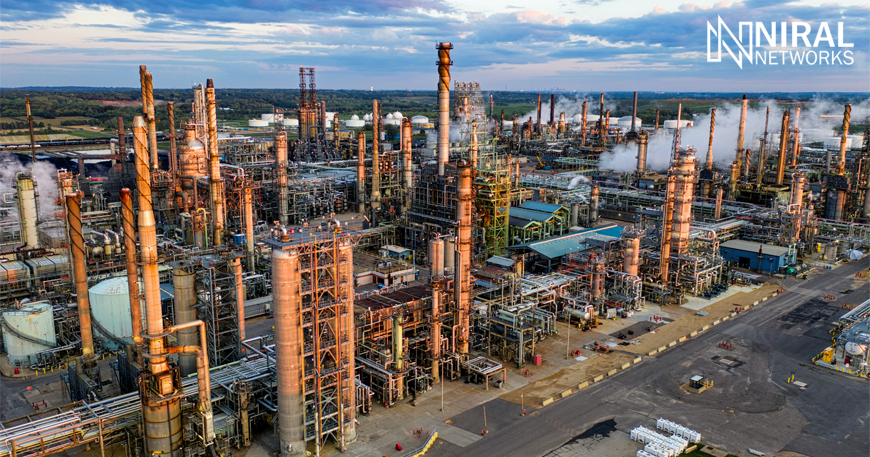Download Oil & Gas Refinery Use Case
The adoption of private 5G technology is the next step in this transformation, as it provides a range of benefits that can improve safety, increase efficiency, and reduce costs. In this playbook, I will discuss the main application areas of private 5G in the Oil & Gas Industry, as well as its opportunities and challenges.
In addition, private 5G networks can support collaboration between different stakeholders in the Oil & Gas Industry, improving coordination and decision-making. According to a report by Gartner, by 2023, more than 50% of all IoT implementations will use private 5G networks, highlighting the growing adoption of this technology in the Oil & Gas Industry.
Main Application Areas of Private 5G in Oil & Gas Industry
- Autonomous Operations: Private 5G networks can support the deployment of autonomous equipment and vehicles, which can be used in various operations, including exploration, drilling, and transportation. These autonomous operations can reduce the risk of accidents and injuries, as well as increase efficiency and productivity.
- Remote Monitoring and Control: Private 5G networks can enable remote monitoring and control of equipment and facilities, allowing operators to track and adjust operations in real-time. This can help to optimize production and reduce downtime, as well as improve safety by enabling operators to respond quickly to potential hazards.
- Asset Tracking: Private 5G networks can provide real-time location data for assets such as equipment, vehicles, and personnel, which can be used to improve safety and security. This can include tracking equipment maintenance and repair schedules, monitoring worker movements in hazardous areas, and identifying potential security threats.
- Augmented Reality and Virtual Reality: Private 5G networks can support the deployment of augmented reality and virtual reality technologies, which can be used for training, simulation, and maintenance purposes. These technologies can provide immersive training experiences, enabling workers to practice operating equipment and performing procedures in a safe and controlled environment.
Opportunities of Private 5G in Oil & Gas Industry
- Improved Safety: Private 5G networks can enable the deployment of autonomous equipment and vehicles, remote monitoring and control, and real-time asset tracking, all of which can improve safety and reduce the risk of accidents and injuries.
- Increased Efficiency: Private 5G networks can enable real-time monitoring and control of operations, as well as the deployment of autonomous equipment and vehicles, which can increase efficiency and productivity.
- Cost Reduction: Private 5G networks can reduce the cost of operations by enabling remote monitoring and control, reducing downtime, and improving asset utilization.
Challenges of Private 5G in Oil & Gas Industry
- Investment Cost: Private 5G networks require significant upfront investment in infrastructure, equipment, and licensing fees, which can be a barrier to adoption for some companies.
- Security Concerns: Private 5G networks require robust security measures to protect against cyber threats and data breaches, which can be a challenge in the Oil & Gas Industry, where data security is a top priority.
- Regulatory Compliance: Private 5G networks must comply with various regulations and standards, which can vary by region and country, making it important for companies to stay up-to-date with the latest requirements.
The Oil and Gas Industry is undergoing a significant transformation, with a focus on digitalization, automation, and sustainability. Below are some of the latest trends in the industry:
- Digitalization: The Oil and Gas Industry is increasingly adopting digital technologies to improve efficiency, reduce costs, and enhance safety. This includes the use of technologies such as big data analytics, Internet of Things (IoT), and artificial intelligence (AI).
- Automation: Automation is playing an increasingly important role in the Oil and Gas Industry, with the deployment of autonomous equipment, such as drones and robots, and the use of autonomous vehicles for transportation.
- Sustainability: The Oil and Gas Industry is also focused on sustainability, with a growing emphasis on reducing carbon emissions and transitioning to renewable energy sources. This includes the adoption of technologies such as carbon capture and storage, as well as the development of renewable energy projects.
- Collaboration: Collaboration is becoming increasingly important in the Oil and Gas Industry, with companies working together to share knowledge, expertise, and resources. This includes partnerships between companies in different sectors, such as the energy and technology sectors, as well as collaboration between different companies within the industry.
Interesting insights into the Oil and Gas Industry include:
- The use of big data analytics and AI is becoming increasingly important in the industry, with companies using these technologies to optimize production, reduce downtime, and improve safety.
- The deployment of autonomous equipment and vehicles is also becoming more common, with companies using drones and robots for exploration, inspection, and maintenance tasks.
- The industry is also embracing new technologies such as blockchain, which can be used to improve transparency and efficiency in areas such as supply chain management and trading.
- The transition to renewable energy sources is gaining momentum, with many companies investing in renewable energy projects and exploring new technologies such as hydrogen fuel cells.
- The industry is also becoming more focused on sustainability, with a growing number of companies setting ambitious targets for reducing carbon emissions and transitioning to renewable energy sources.
How Niral Networks Private 5G Solutions can help Oil & Gas Industry to solve this problem
Niral Networks’ Private 5G Solutions can help the Oil & Gas Industry address many of the challenges it faces. Some of the ways in which Niral Networks’ solutions can help include:
- Improved Communication: Private 5G networks provide reliable, high-speed communication between devices, sensors, and systems, enabling real-time monitoring and control of operations. This can help improve safety, efficiency, and productivity in the Oil & Gas Industry.
- Enhanced Security: Private 5G networks provide a secure and private communication channel, ensuring that data is protected from unauthorized access or interception. This can help safeguard critical operations and data in the Oil & Gas Industry.
- Increased Automation: Private 5G networks can support the deployment of autonomous equipment, such as drones and robots, enabling remote operation and maintenance of assets in hazardous or hard-to-reach areas. This can help improve safety and efficiency in the Oil & Gas Industry.
- Better Analytics: Private 5G networks can support the collection and analysis of large amounts of data from sensors and other devices, enabling better decision-making and optimization of operations. This can help improve efficiency and reduce costs in the Oil & Gas Industry.
- Improved Collaboration: Private 5G networks can support collaboration between different stakeholders in the Oil & Gas Industry, including operators, contractors, and suppliers, enabling real-time sharing of data and information. This can help improve coordination and decision-making in the industry.
Niral Networks’ Private 5G Solutions are tailored to meet the specific needs of the Oil & Gas Industry, providing reliable, secure, and high-performance communication networks that can support a wide range of applications and use cases. With its expertise in technology solution architecture and deep understanding of the Oil & Gas Industry, Niral Networks is well-positioned to help companies in the industry leverage the benefits of private 5G networks to improve safety, efficiency, and profitability.
In conclusion, the Oil and Gas Industry is undergoing a significant transformation, with a focus on digitalization, automation, and sustainability. Companies that embrace these trends and technologies will be better positioned to succeed in the rapidly evolving energy landscape.
Mandate Compliance Required for implementing Private 5G Oil & Gas Industry
PESO (Petroleum and Explosives Safety Organisation) is the regulatory body in India responsible for regulating the Oil and Gas Industry, specifically for the storage, handling, and transportation of petroleum products, explosives, and compressed gases. PESO was established under the Ministry of Commerce and Industry in 1898, and its mandate has since been updated to keep up with the changing needs of the industry.
PESO certification is mandatory for any equipment or device used in hazardous locations, such as oil refineries and gas processing plants. In addition to private 5G networks, equipment such as motors, generators, and other electrical equipment, as well as pressure vessels and pipelines, also require PESO certification. Know more….
At What Cost?
The cost of implementing a private 5G network for an Oil & Gas company can vary depending on factors such as the size of the network, the number of devices and sensors, and the level of customization and integration required. However, the cost of implementing a private 5G network has decreased in recent years, and the benefits that the technology can bring, such as improved safety, efficiency, and productivity, can often outweigh the initial investment.
Moreover, Niral Networks offers customized solutions that are tailored to meet the specific needs and budget of each client. Our team of experts works closely with clients to understand their requirements and provide cost-effective solutions that deliver maximum value.





